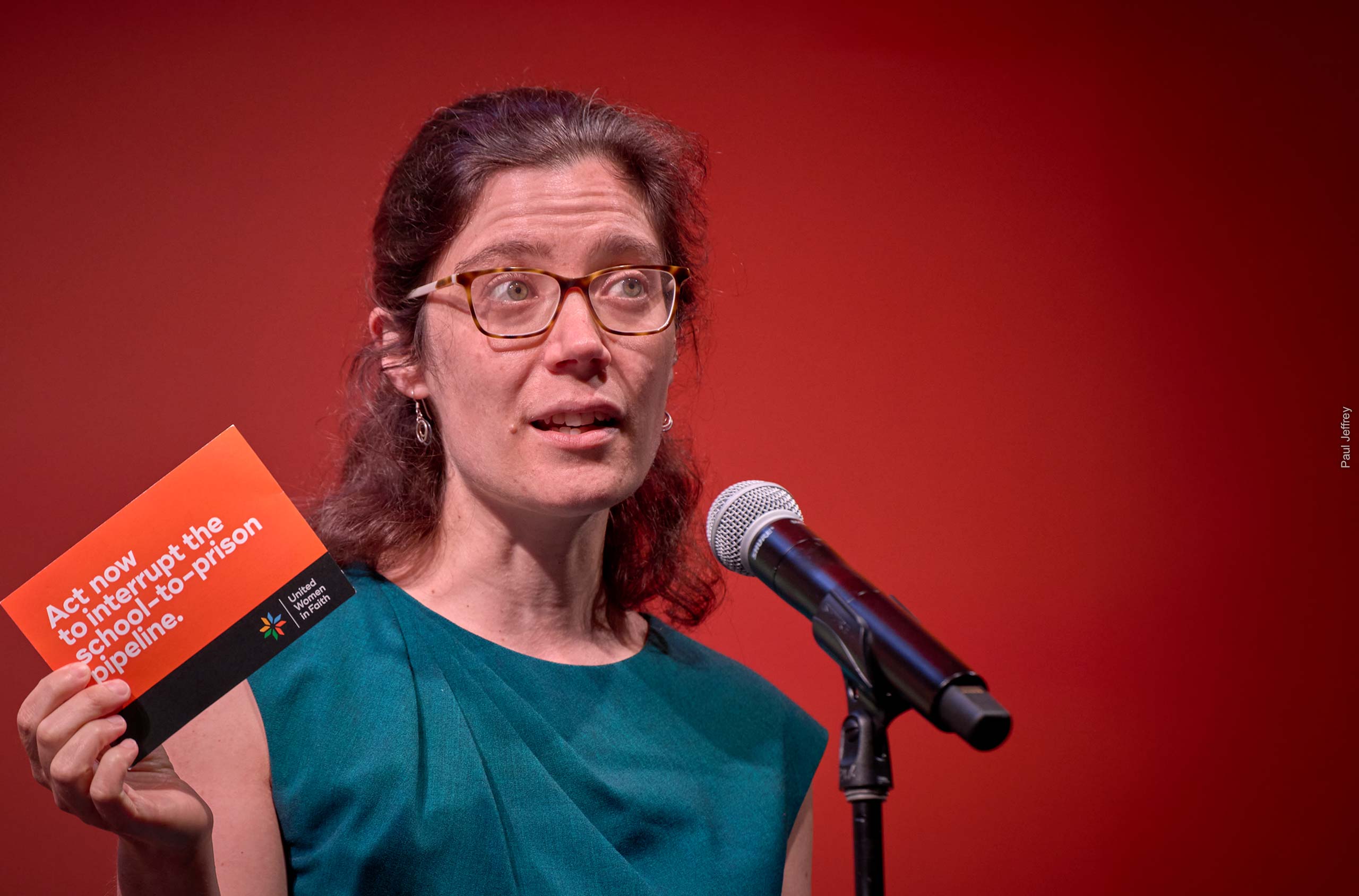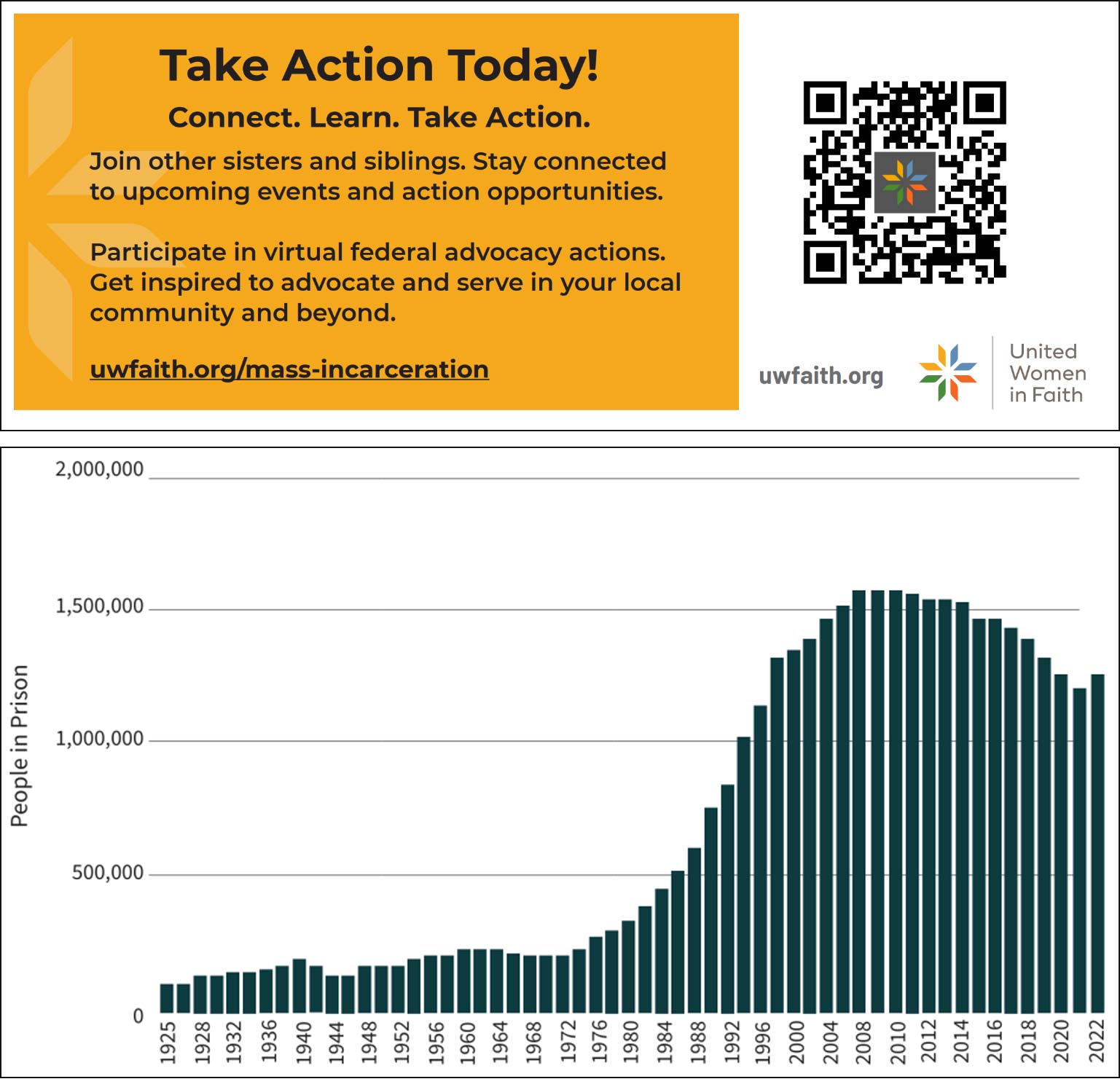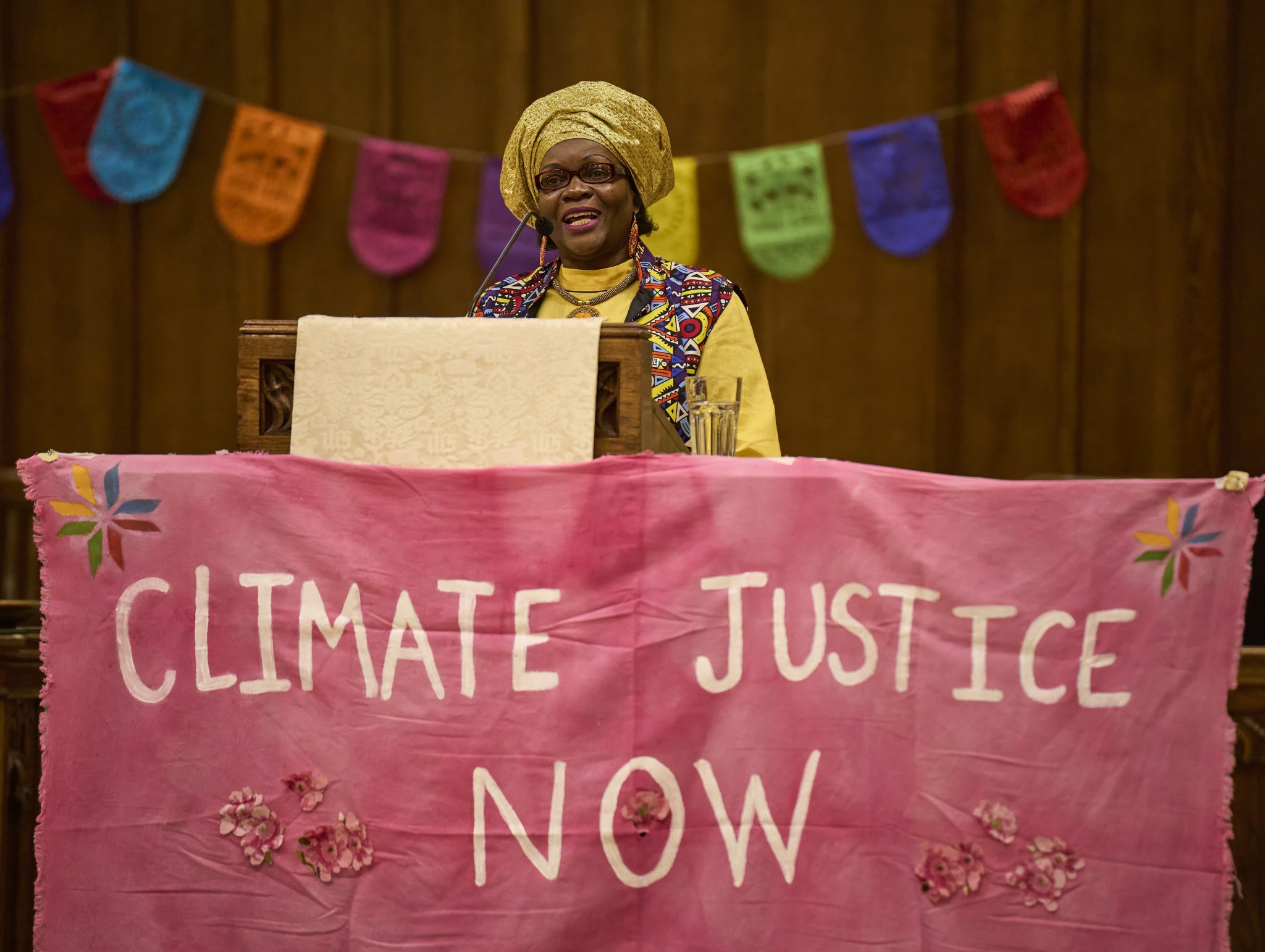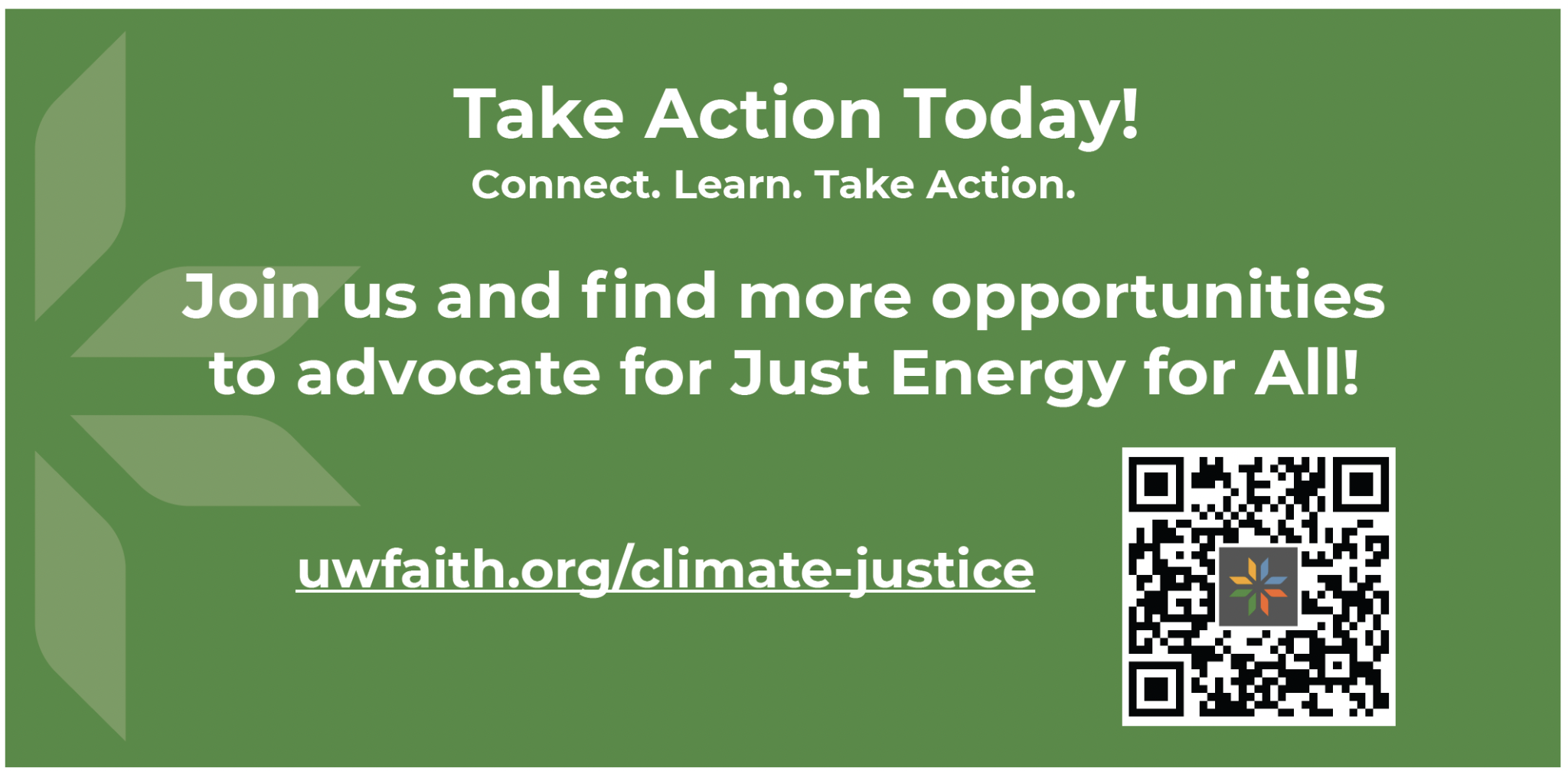
Latest News
Jan./Feb. response: Advocating in the Next Quadrennium
United Women in Faith will continue to work for climate justice and ending mass incarceration and the criminalization of communities of color.
by Elizabeth Chun Hye Lee, Emily Jones, Ilka Vega, and Maryann Verghese
From our founding, United Women in Faith has been committed to advocating for children, youth, and women. Every four years, United Women in Faith identifies a specific focus for advocacy for the quadrennium. In the last quadrennium, we have focused on two social justice priorities: ending mass incarceration and criminalization of communities of color and climate justice. Over the past four years, thousands of legislative actions, dozens of trainings, webinars, and Bible studies, annual meeting messages, and countless local actions have supported our collective work on these two priorities.
You may have seen one or both priorities in the past year at a conference or district event. You may have led a Bible study, joined a webinar, taken a legislative action, or received seed funding for a project in your local area around either one of these issues. Forty percent of local units are currently engaged in at least one of these priorities. Building on the work of the last four years, we are excited to announce that in the 2024-2028 quadrennium, the two social action priorities will continue. Read on to learn more about why we are continuing both priorities and to discover opportunities to engage in the work.
Mass incarceration
The first and clearest reason we are maintaining this priority is the ongoing moral urgency of the issue. According to The Sentencing Project, approximately 2 million people are currently incarcerated in the United States. This is appalling, out of line with all international norms, and transparently racist
Author, legal scholar, and attorney Michelle Alexander describes this time of “the era of mass incarceration” as the “ New Crow.” The number of individuals harmed by mass incarceration far exceeding 2 million, since each incarcerated individual is a part of a family system, a community, a neighborhood, etc. For example, the costs of a parent’s incarceration are keenly felt by the children in a family. Dedicated organizing efforts brought some improvements in the 21st century, though nothing on pace to what is needed. Then, in 2022, we saw incarceration rates again rising.

Graphic image: The Sentencing Project
The criminalization of communities of color remains a pressing issue for our nation.
Given United Women in Faith’s special heart for children and youth, we will continue to focus on interrupting the school-to-prison pipeline. At the same time, where possible, we will seek to expand our efforts to also address other aspects of mass incarceration and the criminalization of communities of color, especially as it impacts women. Racial disparities exist in all areas of the criminal legal systems, including policing, arrests, prosecution and sentencing, plus, tragically, deaths during police encounters. In addition, the intersection of racism and sexism means that the particular harms done to women of color are often swept under the rug, ignored, or dismissed.
For the past two quadrennia, we have been learning, mobilizing, and stepping up to our call to interrupt the school-to-prison pipeline in growing ways. This is a credit to all of you who have been in this work—whether you hosted a Pushout Mission u, joined a film screening, advocated for a necessary policy change, served young people in your local community, or took any of dozens of other vital actions, your work has made a difference!
But your work isn’t finished, yet. Racial disparities in school discipline persist at all levels, from suspensions and expulsions to law enforcement referrals and school-based arrests. School pushout remains common in far too many places, and corporal punishment in schools remains legal in a large swath of the United States. Continuing the school-to-prison pipeline campaign provides continuity with United Women in Faith’s long-term commitments to children and youth, as well as to our commitment to the Charter for Racial Justice. It also builds on the multi-year efforts of your participation in education, mobilization, and base-building—momentum that we cannot afford to lose.
We will be honest: Interrupting the school-to-prison pipeline and ending the scourge of mass incarceration will not be a quick or easy task. There are few easy or quick wins available in this work, and, at times, we may feel rightly discouraged at the slow pace of progress and the sickening speed of backlash. Yet, we remain steadfast in the work, knowing that racial justice is a sacred calling that shapes our life as followers of Jesus Christ.
Like our foremothers, we understand racial justice as an ongoing, permanent, constitutive core value, not a trendy fad to take on when it is popular and drop when it is not. As we seek to live out our Charter commitment to becoming an ever-more deeply antiracist organization in both our internal and external practices, we are committed to stay true to the work until the work is finished.
Looking forward
United Women in Faith remains committed to ending mass incarceration and interrupting the school-to-prison pipeline. We believe that ending the criminalization of communities of color is a foundational justice struggle of the late 20th and early 21st centuries. As an organization historically and presently committed to racial justice and to women, children and youth, we are particularly concerned about rising rates of women’s incarceration and the school-to-prison-pipeline. We envision a world where all people are free and flourishing.
For the next four years, we will continue to work together to learn about the crisis of mass incarceration and the school-to-prison pipeline, we will continue to take action as faith-based women, and we will continue to develop leaders within our membership to join the movement at the local and regional level. Join the mailing list for racial justice at uwfaith.org/mass-incarceration to stay connected to this social priority and opportunities for engagement.
Climate justice
Climate justice is a pressing issue which requires immediate action. United Women in Faith has been a leading voice in environmental and climate justice issues for women since the 1990s, establishing an Environmental and Economic Justice Office.
Through our advocacy, we often bring a gender and equity perspective in climate justice work when partnering in faith and secular spaces, including collaboration with other agencies in The United Methodist Church such as The General Board of Church and Society and Global Ministries. Our role has significant impact as women and children are disproportionately impacted by environmental issues and climate change.


As we know, under the Paris Agreement, we cannot exceed 1.5°C increments of global warming if we are to sustain human life on this planet. The latest Intergovernmental Panel on Climate Change estimates that we are currently at 1.1°C of warming and current climate policies (including continuous fossil fuel operations) are projected to increase global warming by 3.2°C by 2100. This has not only severe consequences for ecosystems and biodiversity but is most likely to exacerbate climate-related disasters putting human life at risk on Earth and potentially displacing over 1 billion people by 2050, according to the Institute for Economics & Peace.
Although they have contributed significantly fewer emissions, the Global South is disproportionately affected by the climate crisis, as are historically marginalized communities across the world and in the United States.
As the largest historical emitter, the United States Fair Share Contribution model of climate action, released by civil society organizations working for global justice, calls for 80 percent emissions reductions by 2035, as failure to do so will result in catastrophic events for our ecosystems, communities, and lives.
The work of our Just Energy for All campaign that implements our climate justice priority addresses the main contributor of the climate crisis, greenhouse gas emissions from fossil fuel. It does so by calling for a just transition from a fossil fuel energy system into a just, clean, and 100 percent renewable energy system while centering on justice and equity.
Through advocacy and mobilization, we have brought our climate justice concerns as women of faith to the United Nations, which is the main decision-making space on climate globally. Most importantly, we have also worked with partners since the beginning of the Just Energy for All campaign at the federal, state, and local level including other faith-based organizations, environmental justice groups, and directly impacted communities in spaces such as the U.S. Climate Action Network, the Breathe Again Collaborative, and others.
The climate crisis is a threat multiplier as it directly and indirectly exacerbates different justice issues that United Women in Faith has historically addressed. These issues range from women’s and children’s health, climate displacement, human trafficking, domestic violence, disparities between Global North and South, and health to income inequality of communities of color in the U.S. and beyond. It is therefore imperative that we continue our climate justice work to adequately respond to the urgency of the climate crisis, but also to protect our legacy of justice as women of faith.
Looking forward
Through the Just Energy for All campaign, United Women in Faith is driving a just transition out of fossil fuels, advocating for energy democracy, equitable investments, and solutions that prioritize community-led initiatives and climate action. Our goal is to inspire and empower members to promote clean, 100 percent renewable energy, and just solutions for people and the planet.
Over the next quadrennium, we will continue this work for training opportunities and legislative and local actions with faith-based and environmental justice organizations and more. Join the climate justice mailing list at uwfaith.org/climate-justice to stay connected and engage in this work.
Prepare for 2025 and beyond
Get ready to take action in the next quadrennium! Whether you are familiar with these priorities or not, now is the time to get involved. You can visit both campaign websites to find action steps, see events, and even take five minutes to act for climate justice and ending mass incarceration.
Websites for the Interrupt the School-to-Prison pipeline campaign (uwfaith.org/mass-incarceration) and the Just Energy for All campaign (uwfaith.org/climate-justice) have suggested actions to take at the individual, unit, district, conference, and jurisdiction level. You can sign up for newsletters for the campaigns, go online to explore resources and suggested activities, and take action today.
Steps you can take:
- Look forward to materials to use at your local unit, district, conference, or in your wider church or community to share about the social action priorities.
- Make conversation around social action a regular part of your United Women in Faith groups, from your circle all the way to your jurisdiction.
- Explore who you can invite to work with you, including local community partners and justice groups.
There may be potential new members who would love to work with you on this intersection of faith and justice. Think about how you can work on these priorities in the next quadrennium and start planning! We need all of us to put love in action.
Elizabeth Chun Hye Lee is director of mobilization and advocacy, Emily Jones is executive for racial justice, Ilka Vega is executive for economic and environmental justice, and Maryann Verghese is managing editor of response.

